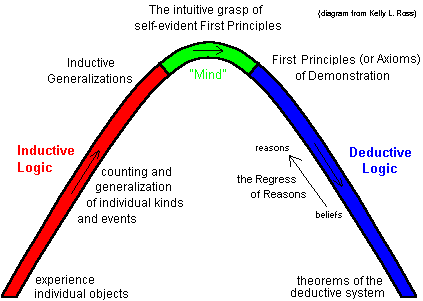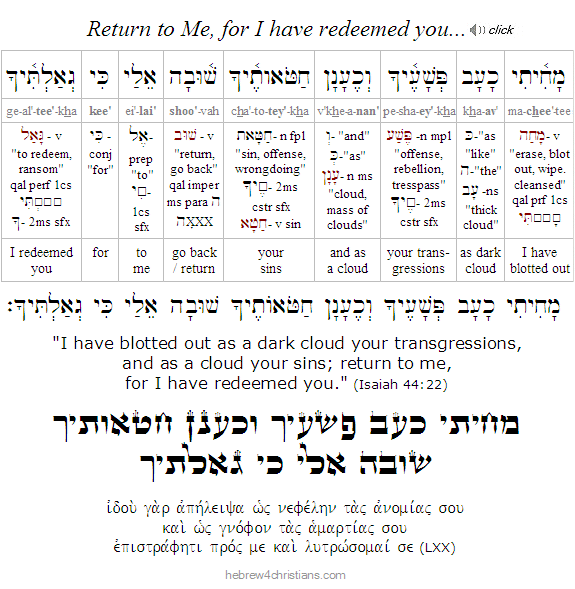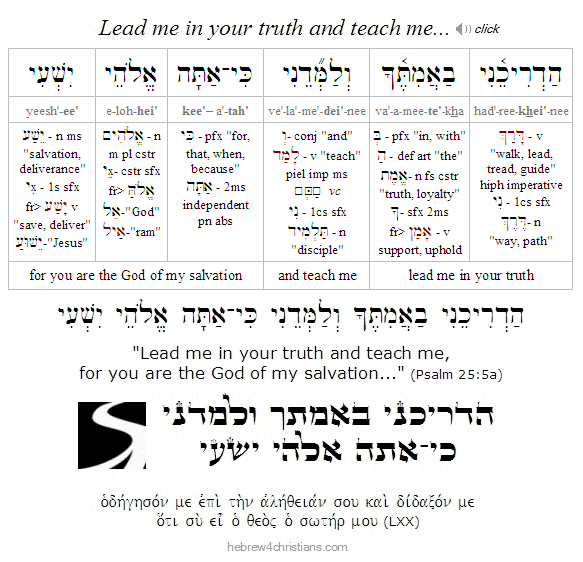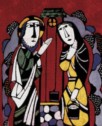|
In another article I mentioned that the central theme of the High Holiday season is teshuvah (ū¬ų╝ų░ū®ūüūĢų╝ūæųĖūö), a word often translated as "repentance," though it's more accurately understood as turning (shuv) to God in response to His call. Indeed, teshuvah can mean both these things: turning and answering... A related Hebrew word is nacham (ūĀųĖūŚųĘūØ), which literally means to "sigh" as a way of expressing regret or sorrow, usually in response to something in the past. Sometimes nacham is used to express the idea of comfort, in the sense of consolation for something lost. The ancient Greek translation of the Bible (i.e., LXX and NT) generally used the word strepho (ŽāŽäŽüßĮ│ŽåŽē) for the word shuv, and the word metanoia (╬╝╬ĄŽäßĮ▒╬Į╬┐╬╣╬▒) for nacham.
In the New Testament, the Greek word metanoia (and its related verb, metanao) is the most commonly used word to express the idea of "repentance." The compound word is formed from '╬╝╬ĄŽä╬▒' (after, with) and '╬Į╬┐╬ĄŽē' (to think) and generally means "changing your mind" (in the noun form) or "thinking differently" (in the verb form). Since it can represent an "afterthought" expressed emotionally as sorrow or regret, metanoia is similar to the idea of nacham (ūĀųĖūŚųĘūØ) in the Hebrew Scriptures. The Greek word strepho (ŽāŽäŽüßĮ│ŽåŽē), like the Hebrew word shuv (ū®ūüūĢų╝ūæ), means to "return" to God in a more practical sense, that is, by performing acts of contrition. In either case, however, a change of direction is implied, and that change ultimately begins with how we think and what we regard as truth.
In this connection it is interesting to compare the Shema as it appears in the Hebrew text with the Greek versions given in the New Testament, because the Greek text adds the word "mind" (or understanding) in the recitation: i.e., "Hear, O Israel: The Lord our God, the Lord is one. And you shall love the Lord your God with all your heart and with all your soul and with all your mind and with all your strength." (Mark 12:29-30). Notice that the original Hebrew text does not include reference to the mind, though the word me'od ("muchness") was translated as "power" (╬┤Žģ╬ĮßĮ▒╬╝╬ĄßĮĮŽé) in the LXX, and this might have been interpreted to mean the power of the mind. Even so, the Greek New Testament uses the word "strength" (ß╝░ŽāŽćßĮ╗Žé) for me'od, so the question of how the word "mind" appeared in the recitation of the Shema is still a bit puzzling. (You can view the textual differences here, if you like.) At any rate, it is significant that the word "mind" or "understanding" (i.e., ╬┤╬╣ßĮ▒╬Į╬┐╬╣╬▒, from ╬┤╬╣ßĮ▒, "through" + ╬Į╬┐ß┐”Žé, "mind"), appears in the text (as well as in Matt. 22:37 and Luke 10:27), especially when we remember that the word metanoia means "changing your thinking" or "changing your mind."
Yeshua's earthly ministry began with the message, "The time is fulfilled, and the kingdom of God is at hand; repent (╬╝╬ĄŽä╬▒╬Į╬┐╬Ąß┐¢Žä╬Ą) and believe (ŽĆ╬╣ŽāŽä╬ĄßĮ╗╬ĄŽä╬Ą) in the gospel" (Mark 1:15). These two verbs (repent, believe) are in the imperative mood. We are commanded to repent, to "change our thinking" and to believe the message of the gospel. As I've said before, trusting in Yeshua is the most important mitzvah of the Scriptures. This implies, among other things, that there is an "ethic of belief," or a moral imperative to accept the truth and reject error in the realm of the spiritual. God holds us responsible for what we think and believe (Acts 17:30-31).
If God holds us responsible to repent and believe the truth of the gospel, He must have made it possible for us to do so ("ought" implies "can"). And indeed, God has created us in His image and likeness so that we are able to discern spiritual truth. He created us with a logical sense (rationality) as well as a moral sense (conscience) so that we can apprehend order and find meaning in the universe He created. All our knowledge presupposes this. Whenever we experience anything through our senses, for example, we use logic to categorize and generalize from the particular to the general, and whenever we make deductions in our thinking (comparing terms, making inferences, and so on), we likewise rely on logic. We have an innate intellectual and moral "compass" that points us to God.
Since we all necessarily must think in order to live, we should value clear thinking. This should be obvious enough, though people often make various errors and misjudgments because they devalue the effort required to carefully think through a question. As William James once said, "A great many people think they are thinking when they are merely rearranging their prejudices." When it comes to questions about the gospel, however, God regards such carelessness to be blameworthy. Again, the LORD holds us accountable for what we think and believe, especially when it comes to the reality and mission of His Son.
The truth about God is always available to human beings, if they are willing to look for it. The Divine Light that was created before the sun and the stars represents God's immanent presence that "lights up" all of creation - including our minds (Gen. 1:3). As Paul stated, "the invisible things of Him from the creation of the world are clearly seen so that people are without excuse" (Rom. 1:19-20). The heavens are constantly attesting to the reality of God's handiwork (Psalm 19:1). All of creation "shouts out" that there is a God. Even small children understand this.
The witness of God's truth is foundational to all of our thinking as well. If you regress far enough in a chain of reasoning, you will always encounter first principles, intuitions, axioms, and "apprehensions" of the laws of thought. This is how language works, or rather, how our mind necessarily discovers truth about reality. For example, the law of contradiction (or identity) is not discovered in experience, but is brought to experience by the operation of the mind. All reasoning is ultimately grounded on foundational first principles that are regarded as self-evident and that are known through the light of the mind itself. Even the pagan Greeks understood this. For instance, Aristotle said that both deduction and induction ultimately were based on the "intuitive grasp" of first principles of thinking itself:
 |
It's important to realize that no one "invented" the rules of logic (such as the law of identity, the law of contradiction, valid rules of inference, etc.); no, these are self-evident and presupposed in all forms of intelligible thinking about anything at all. In other words, God created the mind so that true thinking is possible. If you are reading these words, you are presently using logic. You are identifying and combining letters, interpreting their meaning, making connections and comparisons, and therefore making inferences. There is no way to argue that logic is "artificial" or culturally relative. No one can consistently use logic to argue against its universal validity. The revelation (not the invention) of logical first principles is part of God's "signature," if you will, of how the mind is wired to correspond to reality. Reason discovers order in the universe but does not create it ex nihilo. If you deny this, you have opted out of the realm of thought altogether and entered the realm of the absurd.
Likewise we have intuitive awareness regarding the existence of moral truth (i.e., the standard of justice and moral law), aesthetic truth (i.e., ideals of beauty, goodness, worth, and love), metaphysical truth (i.e., cause and effect relationships), and so on. Even scientific truth is based on principles that transcend the discipline of science itself (for example, the assumption that knowledge is "good" and should be obtained is not an empirical statement). The human mind naturally uses these sorts of categories in its thinking all the time, but each of these are ultimately derived from the rational mind of God Himself.
So God made us so that we could discern truth about reality. The mind functions according to logical laws because it is made in the image and likeness of God Himself... God Himself is the ground of all logic, since He created reality and structured the world to be knowable according to its laws. As it is written: "In the beginning was the word/logic (ßĮü ╬╗ßĮ╣╬│╬┐Žé), and the ╬╗ßĮ╣╬│╬┐Žé was with God, and the ╬╗ßĮ╣╬│╬┐Žé was God" (John 1:1). God created a world that exhibits order and great beauty. And since human beings were created b'tzelem Elohim, in the image of God, our thoughts (and the words used to formulate our thoughts) as well as our actions are likewise intended to exhibit order and beauty. "For the fruit of light (╬║╬▒ŽüŽĆßĮĖŽé Žä╬┐ß┐” ŽĆ╬Į╬ĄßĮ╗╬╝╬▒Žä╬┐Žé) is found in all that is good and right and true" (Eph. 5:9). Therefore "whatever is true... think on these things" (Phil. 4:8).
The Source of all truth is God. He is the Master of the Universe, the Lord of all possible outcomes and worlds. The heavens declare His glory (outer world) and human beings are made b'tzelem Elohim - in His image (inner world). We are all accountable to Him for our lives, and the irresistible testimony of logic reveals His design and order of reality...

The immanence of the divine Light helps us make sense of Yeshua, who is the "Light of the world" that "enlightens every man who comes into the world" (John 1:9; 8:12). Yeshua said, "the Spirit of Truth ... will bear witness about me" (John 15:26). And again, "For this purpose I was born and for this purpose I have come into the world-- to bear witness to the truth (ß╝Ć╬╗ßĮĄ╬Ė╬Ą╬╣╬▒). Everyone who is of the truth listens to my voice" (John 18:37). Heaven and earth might pass away, but the words of Yeshua will never pass away (Matt. 24:35). The life of Yeshua embodies the truth of God (John 14:6).
Click to listen and learn the Hebrew:
 |
Again, we are "epistemologically" responsible to walk in the Spirit of truth and to reject what is false (1 John 4:6). This implies that we have a moral and spiritual duty to think clearly and not abuse our minds (Phil. 4:8; Rom. 12:2). God Himself helps us to do this: "I will ask the Father, and he will give you another Helper (ŽĆ╬▒ŽüßĮ▒╬║╬╗╬ĘŽä╬┐Žé, someone "called to one's side"), to be with you forever, even the Spirit of Truth (ū©ūĢų╝ūŚųĘ ūöųĖūÉų▒ū×ųČū¬), whom the world cannot receive, because it neither sees him nor knows him" (John 14:16-17). God gives us the Spirit of Truth so that we can know the truth about His salvation and to "discern what is the will of God, what is good, acceptable, and perfect" (Rom. 12:2). Truth is connected to memory - both in our personal histories as well as the history of God's redemptive actions performed on our behalf. Hence we are constantly commanded to remember what God has done for us. Similarly, the Spirit of Truth brings to remembrance the words of Yeshua to our hearts (John 14:26).
Followers of Yeshua are commanded to love the truth and to think clearly about their faith. The ministry of reconciliation itself is defined as "the word of truth, by the power of God, through weapons of righteousness" (2 Cor. 6:7). Indeed, the word of truth (ŽäßĮĖ╬Į ╬╗ßĮ╣╬│╬┐╬Į Žäß┐åŽé ß╝Ć╬╗╬Ę╬Ė╬ĄßĮĘ╬▒Žé) is a synonym for the "gospel of salvation" itself (Eph. 1:13; Col. 1:5; James 1:18). We are saved by Yeshua, who is the "way, the truth, and the life" (John 14:6). God commands all people to believe this truth (Acts 17:30-31; 1 Tim. 2:4). People perish because "they refuse to love the truth and so be saved" (2 Thess. 2:10-12). Therefore we see that the issue of truth is central to salvation itself....
Soldiers are often told chazak v'amatz ("be strong and courageous") before they encounter the dangers of the battlefield, but it's vital to remember that each of us is engaged in a spiritual war every day of our lives. This war is essentially a battle for truth. If we accept false ideas about the nature of reality, we will live in a state of weakness and fear, even if our reasoning otherwise seems sound.
In the Torah we learn that both the Tree of Life (ūóųĄūź ūöųĘūŚųĘūÖų╝ų┤ūÖūØ) and the Tree of the Knowledge of Good and Evil (ūóųĄūź ūöųĘūōų╝ųĘūóųĘū¬ ūśūĢų╣ūæ ūĢųĖū©ųĖūó) were present in the original paradise (Gen. 2:9). When Eve listened to the lies of the nachash (serpent) and regarded the forbidden tree as "desirable to make one wise," she immediately began her descent into exile. At the very dawn of human history, then, we see that "truth" (ūÉų▒ū×ųČū¬) apart from God (ūÉ) leads to death (ū×ųĄū¬). Adam and Eve's disobedience led to God's gracious promise regarding the coming "Seed" who would restore all things by being victorious in the war for truth (Gen. 3:15). Of course, this promised Seed was Yeshua, our Suffering Servant and "Second Adam," who, through His sacrifice upon the cross, "reversed the curse" and reconciled humanity with God. Note, however, that this "proto-gospel" message also implied perpetual warfare between the heirs of the Messiah (called the "children of light") and the heirs of Satan (called the "children of darkness"). The ongoing enmity between these "two seeds," then, was foretold to be the "tale of two kingdoms," the Kingdom of God (ū×ųĘū£ų░ūøūĢų╝ū¬ ūÉų▒ū£ūöų┤ūÖūØ) and the kingdom of the devil (John 8:34-6). The Apostles likewise spoke of "children of darkness" and "children of light" (Eph. 5:8; Col. 1:13, 1 Thess. 5:5, etc.). The children of light are called to be am kadosh - a holy people - separate from the evil engendered by the fallen world and its forces, just as the very first creative expression of God was the separation of light from darkness (Gen. 1:3-4). The children of light "hate evil and love the good," and conversely, the children of darkness "hate the good and love evil" (Psalm 34:21, Prov. 8:13, Amos 5:15, John 3:20-21).
Because false teachers abound in the world, each of us is obligated to test (╬┤╬┐╬║╬╣╬╝ßĮ▒╬ČŽē, lit. "determine if a metal is pure") the thinking of others to see if they are truly children of God (1 John 4:1). We must test truth claims. When confronted by false teaching, we are called to "earnestly contend for" (ß╝ÉŽĆ╬▒╬│Žē╬ĮßĮĘ╬Č╬┐╬╝╬▒╬╣, lit. "wrestle over") the truth of the faith (Jude 1:3). That's the response to untruth. On the other hand, we are commanded to "always be ready" to provide a reason (╬╗ßĮ╣╬│╬┐Žé) for the hope that is within us (1 Pet. 3:5). That's the call to be a witness to the truth...
The traditional definition of philosophy is the "love of wisdom" (ŽåßĮĘ╬╗╬┐Žé + Žā╬┐ŽåßĮĘ╬▒), and therefore the followers of the Messiah should be philosophers. After all, Yeshua is called the "Wisdom of God" in the Scriptures (1 Cor. 1:24), and we are told that in Him "are hidden all the treasures of wisdom and knowledge" (Col. 2:3). Moreover, we are explicitly commanded to ask God for heavenly wisdom (James 1:5), though this is "not a wisdom of this age or of the rulers of this age, who are doomed to pass away" (see 1 Cor. 2:6-7). Indeed, the gospel message itself is called the power and wisdom of God (1 Cor. 1:21-24). Disciples of Yeshua are to have the "mind of the Messiah" (1 Cor. 2:16)
Genuine repentance implies that we will change our thinking in order to be transformed by God's truth. The follower of Messiah "cannot do anything against the truth, but only for the truth" (2 Cor. 13:8). During this season of teshuvah, may God help us all to think clearly and to turn our thoughts to Him. May He protect us from the vanity of a darkened mind and from all distractions that attempt to seduce us away from Him. May the LORD give us the purity of heart to do His will in the truth. Amen.
Click to listen and learn the Hebrew:
 |
|






